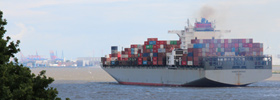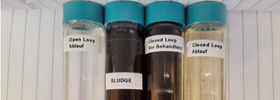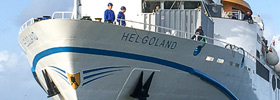BG Verkehr / Dienststelle Schiffssicherheit
Referat Maschine
Brandstwiete 1
20457 Hamburg

Holger Steinbock
Phone: +49 40 36137-217
Fax: +49 40 36137-204
Mail: maschine@bg-verkehr.de

Jörg Heuckeroth
Phone: +49 40 361 37-231
Fax: +49 40 361 37-204
Mobile: +49 171 50 57 038
Mail: maschine@bg-verkehr.de
Bundesamt für Seeschifffahrt und Hydrographie
Referat S 15
Bernhard-Nocht-Straße 78
20359 Hamburg
Katrin Ewert
Phone: +49 40 31 90 74 10
Fax: +49 40 31 90 5000
Mail: marpol@bsh.de
Air pollution from ships · Energy efficiency (MARPOL Annex VI)
Less exhaust gases caused by maritime traffic
The maritime industry is by far the most environmentally friendly mode of transport. However, seagoing vessels produce noxious ship exhaust gases with their use of Heavy Fuel Oil (HFO) as fuel. According to information by Germany’s Federal Environment Agency (Umweltbundesamt, UBA), 60 % to 90 % of the traffic related sulphur dioxide (SO2) emissions in port towns and cities can be ascribed to the use of HFO of seagoing vessels.
The International Maritime Organization IMO has recognized this issue and has adopted several measures. The largest impact will stem from the gradual reduction of the sulphur content in ship exhaust gases. The maritime industry offers several technological solutions to reach this goal among which are exhaust gas cleaning systems and the use of environmentally friendly fuels.
Another measure is the consideration of energy efficiency. The aim of an increased energy efficiency is to lower the usage of energy and the emissions it causes. The IMO stipulates specific energy efficiency design indexes for ships and made Ship Energy Efficiency Management Plans (SEEMP) mandatory.
Moreover, the IMO is developing further plans to reduce green house gases emitted by maritime shipping.
Reporting inadequate reception facilities
Waste generated on board ships - including inter alia sludge, sewage, general garbage - are either disposed of on board e.g. by incineration or discharged to a reception facility at a port. If German-flagged ships encounter difficulties to discharge ship-generated waste under MARPOL Annexes I-VI to port reception facilities, this format should be filled in and supplemented with appropriate details and information and sent to marpol@bsh.de for review and follow-up.
Information on the requirements for the delivery of waste from ships introduced with the PRF Directive (EU) 2019/883 can be found on pur web page "Ship's sewage and garbage (MARPOL Annex IV and V)".





